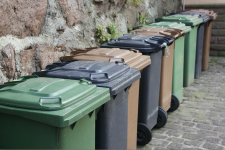Don’t Throw Anything Incriminating Into Your Rubbish Bin

Back in 2002, residents of Portland in the US state of Oregon were questioning whether local police had the power to go rummaging through citizens’ bins looking for evidence of criminal activity, after trash had been left on the side of the road for collection.
As it turned out, police did have the authority to do so.
In March that year, Portland police officers searched the rubbish bin of fellow officer Gina Hoesly on a hunch there might be evidence she was using illegal drugs. Ms Hoesly had registered a complaint with police about being assaulted by her ex-boyfriend, who had a history of drug arrests.
Whilst searching through Hoesly’s trash back at the police station, officers found traces of cocaine, MDMA and methamphetamine, along with drug paraphernalia. The police went so far as to take a used tampon from the bin and send it to a laboratory for drug and DNA testing.
The officers that searched her garbage didn’t apply for a warrant, as they didn’t have enough evidence to be issued with one. However, after the bin search, they had enough evidence to apply for a warrant to search Hoesly’s house. They found more evidence of drug use during that search.
So in June, a number of drug charges were laid against Ms Hoesly.
Once on the curb, it’s public property
During Hoesly’s trial, then Multnomah County prosecutor Mark McDonnell justified the search of the officer’s bins. He said, “There was every indication… she had relinquished her privacy, possessory interest,” as she hadn’t placed any signs on the bins stating, “Do not open. Do not trespass.”
Indeed, it turned out that police throughout Oregon had been searching people’s garbage for the past three decades. And it was a common practice for Portland narcotics officers to conduct “garbage pulls,” searching for evidence once or twice a month.
“Most judges have the opinion that [once] trash is put out… it’s trash, and abandoned in terms of privacy,” then Portland police chief Mark Kroeker told Willamette Week in December 2002.
However, it seems that then Multnomah County Circuit Court Judge Jean Kerr Maurer didn’t share that opinion. Presiding over Ms Hoesly’s case, her Honour ruled that searching people’s garbage was an invasion of privacy, and police needed to obtain a warrant to do so.
But, Mr Kroeker said the judge was out of line with the opinions of other judicial officers. And the Multnomah County District Attorney’s Office vowed to overturn her ruling.
Poetic justice
Portland journalists Chris Lydgate and Nick Budnick decided to take matters into their own hands and show Portland authorities that allowing police to snoop through citizens’ discarded waste was an invasion of privacy.
And to prove their point, the journalists targeted three high-up public officials, who’d been vocal in their support of police searching rubbish bins. Those were police chief Kroeker, the current Multnomah County District Attorney at the time Mike Schrunk, and then Portland mayor Vera Katz.
The local DA was OK with the intrusion. Although, he asked the journalists not to divulge that he had thrown out some of his mementos from his military service, as the Marine Corps would “shoot” him. However, the other two targets didn’t see the comical side of having their trash pried into.
After having told journalists that rubbish left on the side of the road was no longer “a matter of privacy,” the police chief lost his temper at the reporters, as they revealed they had his credit card number, the contents of an email, and an embarrassing note, amongst other personal items of his.
And even though the journalists were only able to swipe the mayor’s recycling, as her garbage was kept right up next to her house, Ms Katz flew into a rage, and threatened legal action against the men.
Can NSW police rifle through your garbage?
In NSW, police search powers are contained in the Law Enforcement (Powers and Responsibilities) Act (LEPRA) 2002.
Section 21 of the LEPRA outlines police powers to stop and search an individual without a warrant, while section 36 provides the conditions for the warrantless search of a vehicle.
The LEPRA also outlines when an officer can search a premises with a warrant or the situations when they can search one without a warrant. However, the LEPRA doesn’t have any provisions that relate to citizens’ garbage when it has been placed on the side of the road awaiting council pick up.
Sydney Criminal Lawyers®’ Wali Shukoor said that the LEPRA provisions in relation to search prevented police entering a private property (including a person’s front or backyard where they might keep their rubbish bin), without a warrant, for the purpose of conducting a search. He further explained that there were no LEPRA provisions which unequivocally prevented police searching a rubbish bin left for collection on public land.
And just to be sure that there weren’t any obscure provisions in the law, we called the Legal Information Access Centre to see if they were aware of any street garbage protections. But, the information officer merely referred us back to the powers laid out in the LEPRA.
So, we sent an email to NSW police, asking whether officers have the power to search bins on the side of the road without a warrant. And whether there’s any NSW legislation governing the searching of garbage bins on the street.
NSW police responded that any legislation regarding this matter would be available via the Attorney General’s office.
Terror-related bin raids
Australian federal police searched garbage bins at residences in five areas across Sydney in late July last year. However, these bin searches accompanied raids on these premises in relation to terrorist activities, and therefore, officers would have been issued with search warrants.
During the raids, officers did find a flight slip with the number of a route from Jakarta to Sydney in the garbage bin at a block of units in Lakemba. But, this turned out to have belonged to another occupant at the apartment block, and not the terrorist suspect.
To be on the safe side
Australian private investigator Chris Cooper told the Australian back in 2014 that “garbage bins are a goldmine of information.”
The Portland journalists similarly declared, “your garbage can is like a trap door that opens on to your most intimate secrets: what you toss away is, in many ways, just as revealing as what you keep.”
As there are no specific laws to protect your garbage as it’s sitting on the side of the road, it’s best not to throw anything into your bins that could implicate you in a crime.







